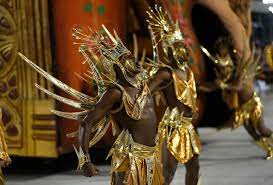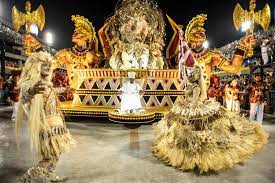"We continue to face prejudice... According to the 47-year-old chef and nutrition student, Simone Soares do Nascimento, "It's a very slow process."
The Brazilian partygoers, decked out in glittering sequins or casual shorts and flip-flops, are grinning as they samba in the summer night, the drink pouring, the music pounding, and the glitter shimmering.
However, the narrative of their song is depressing, painful, and laden with the weight of history—as is frequently the case at Rio de Janeiro's renowned carnival.
Paraiso do Tuiuti, one of the 12 samba schools competing in Rio's renowned carnival parade battle on Sunday and Monday evenings, is in the midst of its last preparations.
Every opulent procession featuring bare skin narrates a tale. This year, Tuiuti's honors Joao Candido, a Brazilian naval sailor who spearheaded an uprising in 1910 against the subjugatory circumstances that African Americans faced while serving on their nation's ships.

In Brazilian history, the "Whip Revolt" is a chapter that is frequently ignored. However, Tuiuti paraders claim that the bigotry and injustice Candido battled are still present in modern-day Brazil.
"We continue to face prejudice... According to 47-year-old chef and nutrition student Simone Soares do Nascimento, "It's a very slow process."
"Yet we're here, enjoying life," she continues, her smile wrapped in glittery sequins.
Candido, a former slave born in 1880, enlisted in the navy at the age of 14.
Slavery was only outlawed in Brazil in 1888, and black soldiers—many of whom were drafted by force—were mistreated, underpaid, and subjected to cruel punishment.
Candido established himself as a helmsman by overcoming prejudice.
He was dispatched to Britain in 1909 to get instruction on two brand-new battleships that Brazil had purchased.
The 20,000-ton "dreadnoughts" were equipped with state-of-the art weaponry.
However, modernizing the navy did nothing to allay the resentment of black sailors against their antiquated treatment.

More than 2,000 Black sailors on Candido's ship mutinied, choosing Candido as their captain, in November 1910 after a sailor received 250 lashes, making his back appear like "a gutted fish," according to a white officer.
Candido, who went as "The Black Admiral," took control of four ships and aimed their weapons onto Rio.
"We shall not allow slavery in the Brazilian navy," the rebels sent a letter to President Hermes da Fonseca at the time.
Following four stressful days, the government granted the mutineers amnesty and decided to do away with flogging.
However, the navy betrayed them when they gave up the ships, holding or killing them.
Candido was placed in a cramped cell with thirty other people. Only he and one other prisoner survived due to the extreme conditions.
He lived in poverty for the remainder of his life.
After Candido passed away in 1969, Brazil reexamined his legacy.
The government built a memorial in his honor in Rio in 2008 and gave him posthumous pardon.
However, the military has resisted attempts to hold him accountable for his abuse.
Federal prosecutors filed a lawsuit in November, requesting that the navy compensate Candido's family for losses.
"My father had a difficult life. Adalberto, 85, the son of Candido, told AFP, "I just want him to get the recognition he deserves for his place in Brazilian history."
Tuiuti and Adalberto, the final surviving kid of Candido's eleven children, will march on Monday night.
A black delivery guy called Max Angelo dos Santos will play Candido, hinting at the relevance of the "Whip Revolt" more than a century later. Max Angelo dos Santos made news last year when he was seen being whipped by a white woman in a posh area.
The legacy of slavery is still evident in Brazil, where 56% of people identify as black or mixed-race.
In the 203 million-person nation, blacks make, on average, half as much as whites do, have shorter life expectancies, and experience prejudice more frequently.

Rio's carnival, driven by the Afro-Brazilian beats of samba music, is not just a massive celebration for people of various colors, backgrounds, and lifestyles; it is also an art form specially adapted to examine such issues.
The primary prosecutor in the lawsuit requesting compensation for Candido's family, Julio Araujo, claims that carnivals serve as a platform for national introspection.
"I and lots of other people have learned so much about Brazil's history -- and its unofficial history -- from watching the samba school parades," he stated to AFP.
"It fuels a conversation that transcends those 70 minutes."
End//voice7news.tv































Comment: